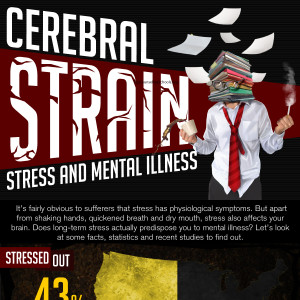Cerebral Strain: Stress and Mental Illness
It’s fairly obvious to sufferers that stress has physiological symptoms. But apart from shaking hands, quickened breath and dry mouth, stress also affects your brain. Does long-term stress actually predispose you to mental illness? Let’s look at some facts, statistics and recent studies to find out.
Stressed Out
43%
Percentage of U.S. adults who suffer adverse health effects from stress (1)
75% to 90% of all doctor’s visits are related to ailments caused from stress. (1)
34%
Percentage of those feeling stressed who admit to also feeling depressed (2)
Most common stressors (2)
Cause: Percent of stressed Americans affected
Money: 76%
Work: 70%
The economy: 65%
Family: 58%
Relationships: 55%
Personal health concerns: 52%
Mortgage/rent: 52%
Personal safety: 30%
Mental Illness in America
43.7 million
Number of adults in the U.S. who have a mental illness. This is 18.6% of all adults. (3)
Most common disorders (4)
Disorder: Prevalence in adults
Major depressive disorder: 14.8 million
Featured Programs
General anxiety disorder: 6.8 million
Panic disorder: 6 million
Obsessive-compulsive disorder: 2.2 million
PTSD
Post-traumatic stress disorder is unique in that it shows a direct link between extreme stress and mental health.
7.7 million
Number of American adults who suffer from PTSD (4)
67%
Percentage of people who have experienced extreme stress due to witnessing violence who develop PTSD
PTSD often occurs with other illnesses such as depression, anxiety disorders and addiction.
The Missing Link
Multiple studies have shown a significant connection between stress and mental health.
Berkeley Study (5)
When: February 2014
Main findings: Chronic stress creates changes in the brain that create a predisposition for mental illness.
Johns Hopkins Study (6)
When: January 2013
Main findings: Using mice, researchers found that extreme stress in adolescents can change brain chemistry to allow for the onset of mental illness.
National Institute of Mental Health (NIMH) Study (3)
When: February 2009
Main findings: Chronic stress may elevate levels of glucocorticoids in the brain. This reduces cell function and may lead to anxiety and depression disorders.
Stress and the Brain
Severe stress can… (5,7,8)
- … increase connectivity between the hippocampus and the amygdala, which affects a person’s fight or flight response time.
- … damage stem cells in the hippocampus that can later set the stage for mental disorders.
- … affect cortisol production in the brain, inhibiting an individual’s ability to cope with more stress.
- … negatively impact a person’s memory retention.
- … produce proteins in the brain that may lead to Alzheimer’s disease.
Sources:
1. http://www.webmd.com
2. https://www.apa.org
3. http://www.nimh.nih.gov
4. http://www.adaa.org
5. http://newscenter.berkeley.edu
6. http://www.hopkinsmedicine.org
7. http://www.ncbi.nlm.nih.gov
8. http://health.howstuffworks.com

